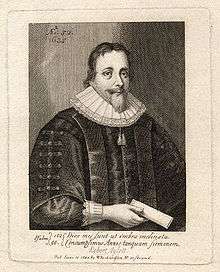Robert Aylett
Robert Aylett (Aylet) (1583? – 1655) was an English lawyer and religious poet.

Life
He was born in Rivenhall, Essex and was educated at Trinity Hall, Cambridge, graduating B.A. in 1605, M.A. in 1608, and LL.D in 1614.[1] Living at Feering, he acted for the archdeacon of Colchester and as justice of the peace.[2] He also acted in Essex as commissary for the Bishop of London, and judge of the Commissary Court; he played a large part in enforcing the Laudian reforms in the county.[3] He became Master of the Faculties in 1642.[4][5]
Works
As a poet his work is related to George Herbert's, but he borrowed quite heavily from Edmund Spenser.[6] Susanna, or the Arraignment of the Two Unjust Elders' was published in 1622. Joseph, or Pharaoh's Favorite, Peace with her Four Gardens (1622) and Thrift's Equipage (1622) are other earlier works.[5]
Divine and Moral Speculations (1654)[7] was dedicated to Henry Pierrepont, 1st Marquess of Dorchester and his wife. A Wife not readymade but bespoke, by Dicus the Batchelor, and made up for him by his fellow shepheard Tityrus; in four pastoral eclogues (1653) is a secular piece.
Notes
- "Aylett, Robert (ALT605R)". A Cambridge Alumni Database. University of Cambridge.
- J. S. Cockburn, Crime in England 1550-1800 (1977), p. 94.
- J. Horace Round, William Page, William Price (editor), Family Origins and Other Studies (1971), p. 108.
- s:Aylett, Robert (DNB00)
- Author Record
- R. M. Cummings, Edmund Spenser: the critical heritage (1995), p. 140.
- Divine and Moral Speculations in Metrical Numbers upon Various Subjects. By Doctor R. Aylet, one of the Masters of the High Court of Chancery. London . . . 1654.
References

Further reading
- John Horace Round, Robert Aylett and Richard Argall. English Historical Review, 38 (1923), 423-4.